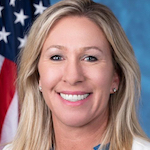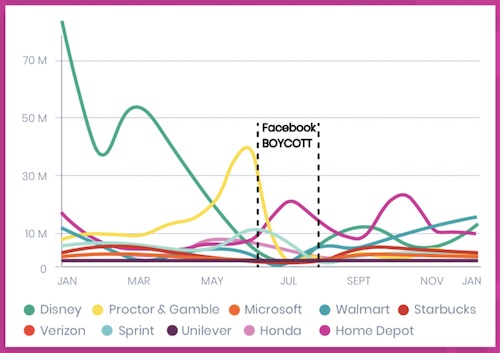 |
| Marjorie Taylor Greene |
Twitter booted Georgia Congresswoman Marjorie Taylor Greene off the site for a week after she violated its COVID-19 misinformation policy for the fourth time.
The crazed QAnon cultist tweeted that the vaccines are failing and that they do not stop the spread of the virus.
Greene must have had a “senior moment” when she fired off that tweet.
In introducing her “Fire Fauci Act” earlier this year, Greene noted that the Centers for Disease Control and Prevention deemed the vaccines “highly effective” at preventing infection.
She also quoted research from Johns Hopkins Medical School, saying the vaccines are 95 percent effective.
Greene’s Fire Fauci Act wants to reduce the salary of the director of the National Institute of Allergy and Infectious Diseases to zero until his replacement is named.
Greene may have one redeeming quality. She has a wicked sense of humor.
The Fire Fauci Act was introduced on April 1, April Fools’ Day.
Verizon and Patagonia are odd corporate bedfellows. One is a staid telecom operation, while the other is noted for its corporate activism.
They have one thing in common: Verizon and Patagonia stick to their word.
Of the more than 1,000 brands that vowed in July 2020 to pull advertising from Facebook until it cracked down on hateful content, only Verizon and Patagonia have stuck with their pledge, according to a report by Pathmatics, a marketing data outfit
 |
Disney, Home Depot, AT&T, Procter & Gamble, AT&T, New York Times Co, Cricket, Wells Fargo, Spring, Netflix and Starbucks earned PR points upon signing up for the #StopHateforProfit campaign but they ultimately caved and crawled back to Facebook, albeit at a lower spending level. Verizon and Patagonia talked the talk and walked the walk.
Seventeen of the Top 25 advertisers participating in the boycott spent less on Facebook in the year after the launch of #StopHateforProfit than in the year before.
Sprint, at 91 percent, topped the list. It was followed by Cricket (87 percent), Netflix (77 percent), Disney 75 percent) and P&G (48 percent).
Since signing the pledge, Verizon and Patagonia have not spent a nickel on Facebook ads, according to Pathmatics.
Despite the economic boycott bid, Facebook soldiered on. It took in $12.9B in advertising in the year prior to the boycott, and $15.3B post-boycott.
Facebook CEO Mark Zuckerberg reported that first-half revenues jumped 51.6 percent to $55.2B, while net income soard 97 percent to $19.9B.
Washington regulators may be the only people able to reel in Facebook.
The days of “false equivalency” are over when it comes to media coverage of climate change, much to the chagrin of Gerry Baker, Wall Street Journal editor-at-large.
He penned an op-ed complaining about the coverage of climate change just ahead of the release of the United Nations International Panel of Climate Change on Aug. 9.
“You will scarcely hear a dissenting voice as the monolithic media faithful echoes every frightening forecast from the scientists whose livelihoods depend on maintaining the highest level of alarm,” Baker wrote in the WSJ.
Baker harkened back to the “heyday of journalism” when skepticism and curiosity were demanded. “The good reporter doubted whatever he was told, even what time it was. He’d weigh competing accounts and explanations and actively seek out alternative versions,” he wrote.
Baker obviously misses the alternative facts of former Trump advisor Kellyanne Conway.
C’mon, Gerry. The UN report was written by 234 scientists and based on more than 14,000 studies.
The left-leaning New York Times called it “the clearest and most comprehensive summary yet of the physical science of climate change.
The right-leaning Financial Times called it “a landmark assessment of climate change that makes it clear that the world faces a frightening future even if the global economy is decarbonised rapidly.”
Baker admits that he’s no climate scientist. He’s confident that Earth is warming and that evasive action would be smart.
“I’m less confident that a spate of historically familiar extreme weather events constitutes proof that we’re going to burn in the next decade or that the action lies only in the most drastic government-mandated responses, which the media will insist we must immediately adopt,” he wrote.
“Historically familiar extreme weather patterns?” He’s got to be kidding.
Baker may not be in the climate change denial camp, but his op-ed attempts to turn back the clock and cast doubt on the media’s coverage of global warming.
The UN Report makes it crystal clear that climate change is real and must be dealt with now.


 Southern governors claim they know what's best for their working class, and it's not pay raises... A Ukrainian human rights group played a key role in convincing House Speaker Mike Johnson to hold a vote to send arms to Ukraine, Israel and Taiwan... Trump Media & Technology Group blames short-selling and not lousy outlook for its stock slump.
Southern governors claim they know what's best for their working class, and it's not pay raises... A Ukrainian human rights group played a key role in convincing House Speaker Mike Johnson to hold a vote to send arms to Ukraine, Israel and Taiwan... Trump Media & Technology Group blames short-selling and not lousy outlook for its stock slump. The techniques deployed by OJ Simpson's defense team in the 'trial of the century' served as a harbinger for those used by Donald Trump... People worry about the politicization of medical science just as much as they fret about another pandemic, according to Edelman Trust Barometer... Book bans aren't restricted to red states as deep blue Illinois, Connecticut and Maryland challenged at least 100 titles in 2023.
The techniques deployed by OJ Simpson's defense team in the 'trial of the century' served as a harbinger for those used by Donald Trump... People worry about the politicization of medical science just as much as they fret about another pandemic, according to Edelman Trust Barometer... Book bans aren't restricted to red states as deep blue Illinois, Connecticut and Maryland challenged at least 100 titles in 2023. The NBA, which promotes legalized gambling 24/7, seems more than hypocritical for banning player for placing bets... Diocese of Brooklyn promises to issue press release the next time one of its priests is charged with sexual abuse... Truth Social aspires to be one of Donald Trump's iconic American brands, just like Trump University or Trump Steaks or Trump Ice Cubes.
The NBA, which promotes legalized gambling 24/7, seems more than hypocritical for banning player for placing bets... Diocese of Brooklyn promises to issue press release the next time one of its priests is charged with sexual abuse... Truth Social aspires to be one of Donald Trump's iconic American brands, just like Trump University or Trump Steaks or Trump Ice Cubes. Publicis Groupe CEO Arthur Sadoun puts competition on notice... Macy's throws in the towel as it appoints two directors nominated by its unwanted suitor... The Profile in Wimpery Award goes to the Ford Presidential Foundation for stiffing American hero and former Wyoming Congresswoman Liz Cheney.
Publicis Groupe CEO Arthur Sadoun puts competition on notice... Macy's throws in the towel as it appoints two directors nominated by its unwanted suitor... The Profile in Wimpery Award goes to the Ford Presidential Foundation for stiffing American hero and former Wyoming Congresswoman Liz Cheney. JPMorgan Chase chief Jamie Dimon's "letter to shareholders" is a must-read for PR people and others interested in fixing America and living up to its potential... Get ready for the PPE shortage when the next pandemic hits... Nixing Netanyahu. Gaza carnage turns US opinion against Israel's prime minister.
JPMorgan Chase chief Jamie Dimon's "letter to shareholders" is a must-read for PR people and others interested in fixing America and living up to its potential... Get ready for the PPE shortage when the next pandemic hits... Nixing Netanyahu. Gaza carnage turns US opinion against Israel's prime minister.


 Have a comment? Send it to
Have a comment? Send it to 
Aug. 11, 2021, by Bill Huey
No, Kevin, I would say Taylor Greene is just nuts. Lots of politicians are nuts, but she stands out. The last congresswoman who had a sense of humor was Patricia Schroeder of Colorado, who, when asked how she was taking her defeat for re-election, said, "Just like a man."